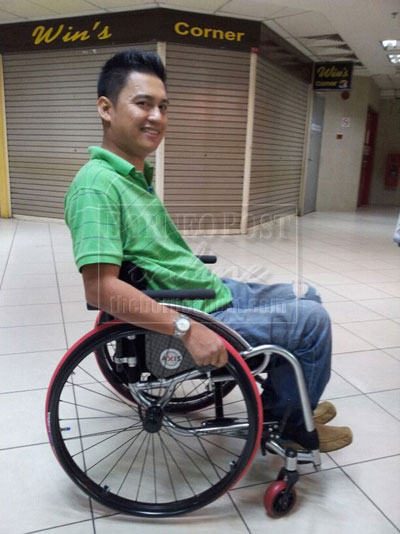Adventures of a first time voter
by Peter Tan. Posted on April 6, 2013, Saturday
THE announcement that had the entire nation waiting in anticipation has come to pass. Our Prime Minister finally dissolved parliament on Wednesday.
Once again, as a citizen, I am raring to exercise my right to vote for candidates who will serve to protect my interests and that of the people and our nation.
I recall the very first time I voted. It was in 2008. I was residing in Selangor but my voting constituency was in Penang.
On the morning of polling day, my wife Wuan got up early to cast her vote at the polling station just down the road from our house.
The plan was that we would make our way up to Penang after she had performed her duty as a citizen. We expected to begin our journey latest by nine o’clock.
We did not set off until an hour and a half later as the polling station was packed to the brim. Wuan had to wait for nearly one hour for her turn.
We did not even pack anything as we planned to drive back immediately after I had voted.
As soon as we hit the North-South Expressway, we were caught in a crawl due to road widening works and unusually heavy traffic.
Most of the vehicles had Perak, Penang and Kedah plates. They were probably like us rushing back to their respective home towns to vote.
The sky that was blue when we began turned dark halfway. Rained pelted our windscreen mercilessly. We had to slow down due to the limited visibility.
I wondered if we could make it in time before the polling station closed and how I was going to get out from the car in that rain.
There were several nasty traffic accidents along the way. We even counted a 10-car pileup that caused a jam several kilometres long.
Upon nearing Penang, we almost got into an accident. Three vehicles that we were following suddenly stepped on their brakes.
Right before our eyes, the lorry ahead of us skidded. It swerved and almost toppled over, the cargo on its load bed shifted violently from one side to another.
I floored the brake pedal. The road was slippery. I mumbled a silent prayer and swerved the car. It did not skid and came to a stop. That was a very close call.
Traffic came to a crawl again as we crossed onto the island. It was already quarter to four. At the rate we were going, we certainly could not make it in time.
I took several shortcuts to avoid the jam but we were not making good time. As the seconds ticked away, I became more and more edgy.
At close to half past four, we were stuck in another jam. The polling station was just 2km away. The rain not only did not let up but became heavier.
That stretch of road we were passing was notorious for flash floods, especially during monsoon seasons. We inched our way slowly in the fast rising water.
When we finally reached the school where the polling station was located, a policeman at the gate stopped us.
I wound down the window and told him that I am an OKU. He waved us through. It was half past four. We had been on the road for six hours already.
Wuan took my identity card and went to get the number for my polling stream. Each polling station has several polling streams. These were rooms where we collect out ballot papers and cast our votes.
As Wuan was getting the wheelchair out from the car boot, a helpful polling station staff came with an umbrella to shield her from the rain and for me to get out from the car.
There were numerous steps from the car park to the polling stream. Wuan had to lift my wheelchair over these barriers several times.
After the officers in the polling stream verified my identity card and gave me the ballot papers, I wheeled myself to the booth.
I had some difficulty holding the pencil to mark the ballot papers with my weak hand.
After marking the paper for parliamentary seat, I pondered over who to vote for for the state seat. Penangites have a tendency to give the vote to BN for state and DAP for parliament.
I must have taken a little too long to decide because the ballot box officer stood up to peek at me. I quickly marked the other paper and slotted them into the respective ballot boxes.
As I got out from the room, I felt relieved and happy that I made it. That long journey was not in vain.
Traffic on the expressway was smooth the entire trip back. When we reached Ipoh, news trickled in that the alliance of DAP, PKR and PAS had won the majority of seats in Penang.
We reached home at one o’clock in the morning, tired, hungry and in serious need of a warm bath to soothe our aching muscles. A quick check on the Internet before bed revealed that BN also lost Perak and Selangor.
All in all, I had driven 800km in 15 hours for the round trip. I am proud to have exercised my right to vote for the first time after 42 years as a citizen. It was truly an unforgettable adventure.
Comments can reach the writer via columnists@theborneopost.com.
Read more: http://www.theborneopost.com/2013/04/06/adventures-of-a-first-time-voter/

